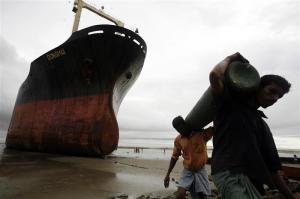
Workers at Chittagong in 2009
Bangladesh’s courts put their foot down (again) this week on shipbreaking, one of the world’s dirtiest and most dangerous industries. The Supreme Court in the capital city Dhaka re-asserted that all ships coming into the nation to be dismantled for scrap metal will now be required to carry proof that they have been decontaminated of toxic chemicals before entering Bangladesh’s waters.
Technically, Bangladesh has been here before in the ongoing fight between the courts, environmentalists and shipbreakers that has been playing out for the past few years. Shipbreaking is big business in Bangladesh, where nearly 200 decommissioned ships were dragged onto beaches last year to be broken down by thousands of workers working in life-threatening conditions inside their hulls. Working without a roadmap or a plan, the dismantling itself is dangerous enough. Add to that the exposure of chemicals like nickel, chromium, iron, asbestos and lead inside the uncleaned ships, and shipbreaking is, statistically, one of the deadliest jobs in the world.
This week’s decision could start to ameliorate those odds. Though the court gave yard owners the right to appeal its decision, they cannot do so for another four months. In the meantime, the law requires that old ships carry paperwork issued by the environmental authorities of the nation selling the ship certifying that is has been pre-cleaned of toxins before coming to one of Bangladesh’s 100 breaking yards.
How did Bangladesh, whose GDP ranks a low 198 of 227 countries, get stuck with the industrialized world’s nautical leftovers in the first place? According to Muhammed Ali Shahin of the NGO Platform on Shipbreaking, it was by accident. A ship got stuck in the mud off the coast in the early 1960s, and local residents came to break up and sell the iron for cash. Before that time, Shahin says, shipbreaking was more often done in Europe, but the high cost of labor and keeping up with environmental standards made countries like Bangladesh and India, which is also home to a huge shipbreaking business, convenient alternatives. “Maybe it started as an accident,” says Shahin, “But it has been expanded by the shipping companies. They wanted to get rid of shipbreaking in their own countries.”
The long legal fight to clean up the industry has been led by environmental lawyer and Goldman Prize winner Rizwana Hasan, featured last year as one of TIME’s Heroes of the Environment. Hasan has been pressing for this law on behalf of the workers and the land since 2003. She is head of the Bangladesh Environmental Lawyers Association (BELA), which first brought this week’s case to court. “Because of the social inequity that prevails here, that creates the scope for further exploitation of the poor,” Hasan told TIME in 2009. “As an NGO, you can raise the issue, but at the end of the day it’s the government who has to make a change.”
This week, they did. Granted, the court passed the same law earlier this year, but then backed down from it slightly after strikes at the shipbreaking yards, allowing ships to carry their own certificates saying they were pre-cleaned. We’ll see if this ruling sticks. In any case, the shipbreaking industry, which employs thousands of people from across Bangladesh, is, understandably, not amused. Anam Chowdhury of the Bangladesh Ship Breakers Association told AFP:
“This latest court order could bring an end to the ship-breaking industry in Bangladesh. Thousands of workers will lose their jobs…[Environmental groups] want Bangladesh —a third-world country — to maintain European standards. Even India, our main competitor in the ship-breaking industry, does not have such standards.”
As the effort to phase out single-hull ships gains momentum, the number of vessels that will have to be dismantled will continue to rise. If Bangladesh’s new regulations make it unattractive for businesses that want to break down their ships on the cheap, that business will most likely move into regions willing to do it for them, and where, chances are, the courts are not on the side of the workers. If it must be so, may there also be a young, firey lawyer in their midst, ready to fight for them.


